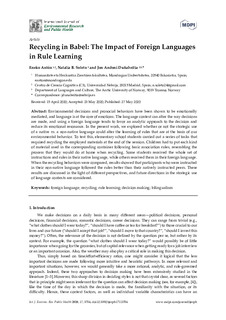| dc.rights.license | Attribution 4.0 International | * |
| dc.contributor.author | Antón, Eneko | |
| dc.contributor.other | Soleto, Natalia B. | |
| dc.contributor.other | Duñabeitia, Jon Andoni | |
| dc.date.accessioned | 2020-05-27T12:35:42Z | |
| dc.date.available | 2020-05-27T12:35:42Z | |
| dc.date.issued | 2020-05-27 | |
| dc.identifier.issn | 1660-4601 | en |
| dc.identifier.other | https://katalogoa.mondragon.edu/janium-bin/janium_login_opac.pl?find&ficha_no=158186 | en |
| dc.identifier.uri | https://hdl.handle.net/20.500.11984/1666 | |
| dc.description.abstract | Environmental decisions and prosocial behaviors have been shown to be emotionally mediated, and language is at the core of emotions. The language context can alter the way decisions are made, and using a foreign language tends to favor an analytic approach to the decision and reduce its emotional resonance. In the present work, we explored whether or not the strategic use of a native vs. a non-native language could alter the learning of rules that are at the basis of our environmental behavior. To test this, elementary school students carried out a series of tasks that required recycling the employed materials at the end of the session. Children had to put each kind of material used in the corresponding container following basic association rules, resembling the process that they would do at home when recycling. Some students received the whole set of instructions and rules in their native language, while others received them in their foreign language. When the recycling behaviors were compared, results showed that participants who were instructed in their non-native language followed the rules better than their natively instructed peers. These results are discussed in the light of different perspectives, and future directions in the strategic use of language contexts are considered. | en |
| dc.description.sponsorship | Gobierno de España | es |
| dc.description.sponsorship | Comunidad de Madrid | es |
| dc.language.iso | eng | en |
| dc.publisher | MDPI | en |
| dc.rights | © 2020 by the authors. Licensee MDPI, Basel, Switzerland | en |
| dc.rights.uri | http://creativecommons.org/licenses/by/4.0/ | * |
| dc.subject | Foreign language | en |
| dc.subject | Recycling | en |
| dc.subject | Rule learning | en |
| dc.subject | Decision making | en |
| dc.subject | Bilingualism | en |
| dc.title | Recycling in Babel: The Impact of Foreign Languages in Rule Learning | en |
| dcterms.accessRights | http://purl.org/coar/access_right/c_abf2 | en |
| dcterms.source | International Journal of Environmental Research and Public Health | en |
| local.contributor.group | Berrikuntza eta esku-hartzea gizarte kulturanitz eta eleanitzetan | eu |
| local.description.peerreviewed | true | en |
| local.identifier.doi | https://doi.org/10.3390/ijerph17113784 | en |
| local.contributor.otherinstitution | https://ror.org/03tzyrt94 | es |
| local.contributor.otherinstitution | https://ror.org/00wge5k78 | en |
| local.source.details | Vol. 11, nº 11, nº artículo 3784 | eu_ES |
| oaire.format.mimetype | application/pdf | |
| oaire.file | $DSPACE\assetstore | |
| oaire.resourceType | http://purl.org/coar/resource_type/c_6501 | en |
| oaire.version | http://purl.org/coar/version/c_970fb48d4fbd8a85 | en |








